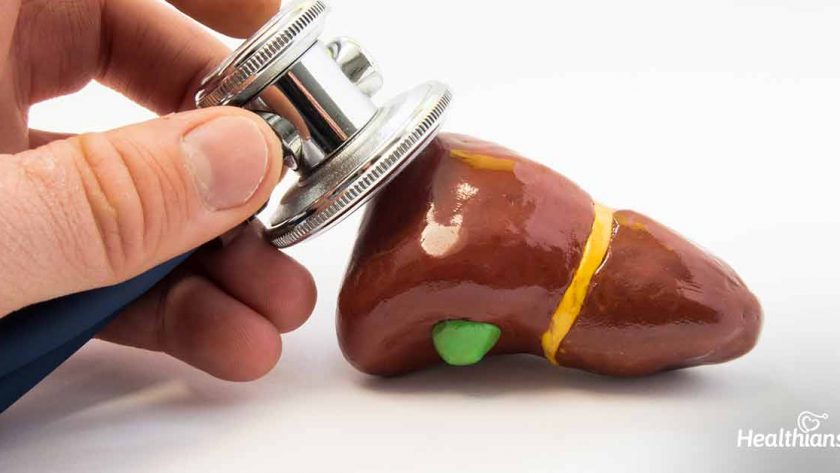[ad_1]
Contributed by: Priyaish Srivastava
Introduction
The liver is a vital organ that is responsible for various functions of your body. Liver complications should not be overlooked as they can result in life-threatening conditions. If your liver is affected by an infection, as a consequence it can influence your several bodily functions and lead to severe health complications like liver cirrhosis, liver failure, or even liver cancer. The functioning of your liver is compromised when the infection has spread and has affected nearly three quarter or 75% area of the organ.
According to data published by WHO, in 2018, India ranked 62 in terms of deaths caused due to liver failure. Implying that 3% (roughly numbered at 2,64,193) of total deaths in the country were due to liver problems.
Continue reading to learn more about the common problems that affect your liver including symptoms of liver diseases, their diagnosis, treatment, and the necessary preventive measures that can help protect your liver.
Liver problems
Alcohol is one of the primary causes of liver infection. It works as a slow poison for your liver resulting in permanent damage to the organ by causing a chronic liver condition. Some of the common liver problems are hepatitis, autoimmune diseases, genetically inherited conditions, cirrhosis, and liver failure, which often leads to the final solution of a ‘liver transplant’. Let us discuss these liver diseases in detail for your better understanding:
Hepatitis
Hepatitis is a viral liver infection that causes inflammation and obstructs the normal functioning of the liver. It can occur as an acute infection or a chronic one. A timely diagnosis can help cure and control the disease. There are five types of hepatitis:
-
- Hepatitis A virus (HAV): Hep A is one of the most common hepatitis viruses in India and occurs with a sensation of inflammation in your liver. It usually appears when you swallow contaminated water or food, or you’ve come in transfusional contact with any person who is already infected by the virus. Unlike Hep B and C, the Hep A virus does not have any chronic effect on your liver and more often than not cures itself without any treatment within a few weeks.
-
- Hepatitis B virus (HBV): Hep B can be both acute and chronic. Although it is transferred through bodily fluids, in most cases it is transmitted from the mother to the newborn during delivery. According to World Health Organisation (WHO), the HBV virus is a global health problem and the disease is incurable. It can only be managed with regular screenings and medications. If you develop Hep B in adulthood, there are only 5% chances that it will turn from acute to chronic, whereas there are 95% chances that an infant with HBV virus may develop the symptoms of chronic liver disease. However, there are vaccines available that provide 98% to 100% protection from this infection.
-
- Hepatitis C virus (HCV): One of the most dangerous of hepatitis variants, Hep C is a blood-borne virus and can be transmitted through bodily fluids, blood transfusion, or unprotected sex. It can be both acute and chronic and in most cases, it can be cured with antiviral medicines. However, it is important to note that Hep C remains asymptomatic in its acute stage but if left untreated it can aggravate chronic Hep C and give rise to a life-long liver ailment like permanent liver damage. Regular screenings can help cure the disease.
-
- Hepatitis D virus (HDV): Hepatitis D is an uncommon but deadly Hepatitis infection that exclusively affects those who are already infected by the chronic Hepatitis B virus. HDV, like Hepatitis B, can be acute or chronic, and it affects around 5% of persons who have the Hepatitis B virus. Hep D has a low success rate for treatment, but it can be avoided by immunizing your body against the Hepatitis B virus.
-
- Hepatitis E virus (HEV): Hepatitis E is the most prevalent hepatitis virus in India, and it can cause liver damage, especially if you drink contaminated water. The Hep E virus is a short-term infection that has no long-term consequences. The complications of HEV are flushed out of your body within a few weeks of contamination.
Symptoms of hepatitis
-
-
-
-
-
-
-
-
-
-
-
-
- Jaundice
- Dark urine
- A feeling of extreme tiredness, weakness, and lack of energy
- Uncomfortable stomach and vomiting
- Joint and muscle pain
- Pale stool
- Not feeling like eating even after a long gap
-
-
-
-
-
-
-
-
-
-
-
Fatty liver disease
Fatty liver is a disease that occurs when your body is unable to metabolize the unprocessed fat accumulating in your liver. This concentration of undigested fat around the liver gives rise to fatty liver diseases. There are five types of fatty liver diseases:
-
- Nonalcoholic fatty liver disease (NAFLD): Nonalcoholic fatty liver disease (NAFLD) is a condition in which your liver develops fat even if you consume little or no alcohol. The specific reason for the occurrence of this disease is still unknown but it affects more than 10 million Indians every year. It is a chronic condition that cannot be cured but appropriate measures can be taken to help manage the condition.
-
- Nonalcoholic steatohepatitis (NASH): Nonalcoholic steatohepatitis (NASH) is an advanced form of NAFLD that occurs due to the development of fatty tissues near the liver. People with diabetes, obesity or high cholesterol are more likely to get affected by this disease. Similar to NAFLD, there is no permanent cure available for NASH, but it may be controlled by following a healthy routine.
-
- Alcoholic fatty liver disease (ALFD): We all know that alcohol is injurious to health, and yet we ignore the warning. In the condition of alcoholic fatty liver disease (ALFD), alcohol damages your liver and obstructs its functioning. This obstruction results in the development of fatty tissues in your liver. Quitting alcohol may help you in reversing the situation.
-
- Acute fatty liver of pregnancy (AFLP): With the cause unknown, acute fatty liver of pregnancy (AFLP) is a serious condition that affects only pregnant women during the third trimester (the last phase of pregnancy). In this condition, the doctor suggests delivering the baby as soon as possible because the infection possess an equal threat to the mother and the baby. Follow-up care of several weeks after delivery can revitalize your liver health back to normal.
-
- Alcoholic steatohepatitis (ASH): Alcoholic steatohepatitis (ASH) is a condition in which along with fat build-up around the liver you may also experience inflammation. Similar to ALFD, ASH also develops due to alcohol abuse. This condition is also termed alcoholic hepatitis and if left untreated, it can lead to liver failure or cirrhosis. Avoiding the consumption of alcohol may help in reversing the condition.
Symptoms of fatty liver disease
-
-
-
-
-
-
-
-
-
-
-
- Involuntary weight loss
- Skin irritation
- Pain in the right side of the stomach
- Unexplained swelling in leg and abdomen
- Experiencing chills, fever, and night sweats
-
-
-
-
-
-
-
-
-
-
Genetic conditions
Your liver can be affected by genetic conditions that you inherit from your parents. The two most common genetic conditions that affect your liver health:
-
- Hemochromatosis: Hemochromatosis is a condition in which your body stores more iron than needed. This iron overload mostly affects men than women and causes obstruction in liver function that leads to serious liver complications like liver failure, liver cancer, or cirrhosis.
-
- Alpha-1 Antitrypsin Deficiency: Alpha-1 antitrypsin deficiency is an inherited condition in which you lack an essential liver protein known as Alpha-1 Antitrypsin. This protein helps protect your body from preventing enzyme breakdown throughout your body. A lack of alpha-1 antitrypsin can cause serious liver complications like cirrhosis, and it may also affect your lungs. Although there is no cure available, however, the treatment of liver cirrhosis can help prevent the disease
Symptoms of liver issues due to genetic conditions
-
-
-
-
-
-
-
-
-
- Jaundice
- Extreme exhaustion and low energy
- Joint inflammation and stomach pain
- A decreased habit of eating food
- Inflammation of the legs and stomach due to fluid buildup
-
-
-
-
-
-
-
-
Liver cancer
Any signs of cancer should never be ignored or left untreated or it can be life-threatening. Excessive alcohol consumption, long-term Hepatitis B or C, and fatty liver diseases can contribute to the development of cancerous cells in your liver.
Symptoms of liver cancer
-
-
-
-
-
-
-
-
-
-
-
- Jaundice
- Less urge to eat
- Uneasiness in stomach
- A feeling of fullness in the right side and left side of the ribs
- Pain in stomach and right shoulder
- Fluid buildup in the stomach
- Dry skin and body itching
-
-
-
-
-
-
-
-
-
-
Liver cirrhosis
Liver cirrhosis is a disease in which your liver tissues get scarred and cause liver damage. Cirrhosis is primarily caused by long-term alcohol abuse. Although the biological formation of the liver allows it to regenerate and heal the scars, the process can increase the development of scar tissue. Cirrhosis can be life-threatening if left untreated, but it can be managed if diagnosed early.
Symptoms of liver cirrhosis
-
-
-
-
-
-
-
-
-
-
-
- Jaundice
- Chronic tiredness
- Loss of hunger
- Unintentional weight loss
- Extremely itchy skin
- Joint and stomach ache
- Unexpected bruising and bleeding
-
-
-
-
-
-
-
-
-
-
Liver failure
Liver failure is a serious condition that occurs when the liver is no longer able to perform its metabolic and synthetic functions due to catastrophic liver damage. It generally develops due to underlying diseases like Hep B, Hep C, liver cancer, and long-term alcohol abuse, to name a few.
Symptoms of liver failure
-
-
-
-
-
-
-
-
-
-
-
- Jaundice
- Inflamed stomach and legs
- Difficulty in concentrating
- Sleepiness
- Unwillingness to eat
- Diarrhea
-
-
-
-
-
-
-
-
-
-
The liver is one of the most important and second-largest organs in the body. It performs various bodily functions like absorbing nutrients from the food for energy, body detoxification, and maintaining metabolism. Upon noticing any liver-related symptoms, you should immediately consult a doctor to avoid serious health complications.
Diagnosis of liver complications
An early diagnosis at the onset of liver diseases symptoms can help in controlling the complications and save you from several life-threatening conditions. Liver complications are primarily diagnosed with blood tests. Let us discuss them in detail:
Blood test
If faced with symptoms of any type of liver condition, your doctor will most likely recommend a complete blood panel test that includes several components. The most commonly performed blood tests for diagnosing liver complications are:
-
- Serum bilirubin test: Bilirubin is a yellow-colored compound that forms when the red blood cells break down and is responsible for the clearance of dead red blood cells from your body. This test helps in measuring the level of bilirubin in your body. An increase in the level can obstruct the formation and flow of bile juice.
-
- Serum alkaline phosphatase test: Alkaline phosphate is a protein found in the liver that aids in the functioning of the organ. This test is used to determine the level of alkaline phosphate in your liver.
-
- Serum aminotransferases (transaminases): Aminotransferase is an enzyme that is released if your liver is damaged. This test helps in determining its presence in your blood and ascertain the seriousness of the condition.
-
- Prothrombin time (PTT) test: This test helps in determining the time taken for blood to clot. If the duration of clotting is long, it is an indication of a damaged liver.
-
- Alanine transaminase (ALT) test: This test helps in determining liver performance and acute liver diseases like Hepatitis.
-
- Aspartate transaminase (AST) test: This test determines the presence of aspartate transaminase [an enzyme that is released in your bloodstream in case of damage caused to the liver, kidneys, heart, pancreas, and even damaged red blood cells (RBCs)]. The presence of this enzyme indicated damage to any of these organs and the RBCs.
-
- Gamma-glutamyl transpeptidase test: Gamma-glutamyl transpeptidase is an enzyme present in the liver which is responsible for the movement of molecules around the body. This movement is obstructed by alcohol consumption and the test helps in assessing the liver condition due to the obstruction.
Prevention of liver complications
Liver complications can be prevented and reversed by the following steps:
-
- Avoiding alcohol consumption
- Exercising regularly to maintain a healthy weight
- Reducing the consumption of non-vegetarian food and excessive salt
- Monitoring your blood glucose levels regularly
- Increase the consumption of leafy greens
- Drinking a sufficient amount of water
Final thoughts
Although liver complications can turn fatal, still early diagnosis and preventive measures with timely and proper medical attention can help you control and cure many liver diseases.
Book The Liver Function Test Today!
This post has already been read 7 times!
[ad_2]
Source link




